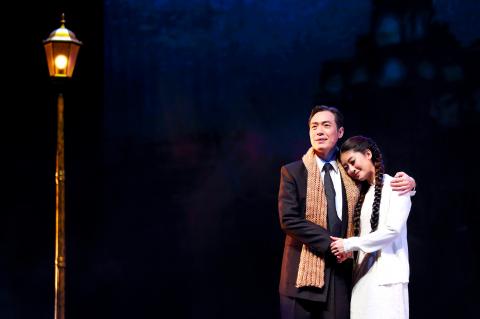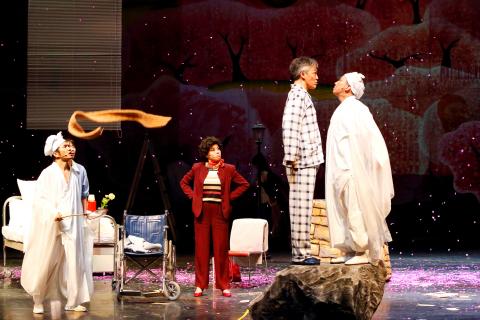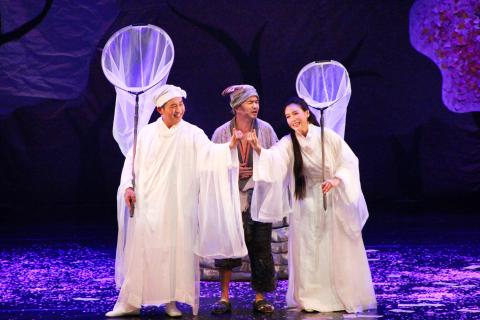The Secret Love in Peach Blossom Land (暗戀桃花源) was not the Taipei-based Performance Workshop’s (表演工作坊) first production; that honor went to That Night We Performed Crosstalk (那一夜,我們說相聲) in 1985.
Yet despite the company’s and founder Stan Lai’s (賴聲川) multitude of works since then, it is Secret Love in Peach Blossom Land, which premiered in 1986, that they remain most famous for.
The company has revived the play three times in Taiwan (1991, 1999 and 2006) — something previously unheard of in local theatrical circles — turned it into an award-winning film (1992’s The Peach Blossom Land), toured the world with it, including an 80-show run at the Oregon Shakepeare Festival in 2015 and staged the first official version in China in 2006, where it had been famous for years through bootleg DVDs and unauthorized performances.

Photo Courtesy of Performance Workshop
ICONIC CONTEMPORARY THEATER
Yet audiences, especially in the Chinese-speaking world, cannot get enough of the play. It is considered an iconic mainstay of contemporary Chinese theater.
So to mark the play’s 30th anniversary last year, Performance Workshop mounted a new production of the show, which it took to Singapore in February; Kaohsiung, Chungli and Chiayi in April and now moves into the National Theater in Taipei next week for six performances.

Photo Courtesy of Performance Workshop
Secret Love in Peach Blossom Land is about two companies that have accidentally been booked into same space for their dress rehearsals. Each has an opening night in just two days’ time, so neither is willing to concede the stage to the other.
One group needs to rehearse Secret Love, a tragedy about a couple separated by a China’s Civil War, centering on a dying man in Taipei and the woman he left in Shanghai.

Photo Courtesy of Performance Workshop
The other group is doing Peach Blossom Land, a comedy based on a classic Chinese poem about a lost fisherman who lands in a utopia where the people have no memories. However, the fisherman cannot forget his estranged wife, especially because two of the people he meets look just like his wife and her new lover.
As the two groups of players struggle for control of the space, they bicker, critique each other’s shows, steal each other’s props and eventually end up dividing the stage in half and trying to rehearse at the same time.
At its heart, Secret Love in Peach Blossom Land is about love, memories and the people we cannot forget, which is why it continues to strike a chord with so many people.
IMPROVISATION
Lai created the original production through structured improvisation with his cast, and continued to tinker with it in successive shows to keep things challenging. In 1991, that meant inviting movie star Brigitte Lin (林青霞) to make her theatrical debut as the Shanghai love, Yun Zhi-fan, a role she reprised in the film version.
In 1999, it was about inviting a younger generation of actors to step into the leading roles, while for the 20th anniversary production Lai invited the Ming Hwa Yuan Taiwanese Opera Company (明華園) to collaborate.
For this latest version, Lai turned the directing reins over to longtime Performance Workshop stalwart, actress and director Ismene Ting (丁乃箏), who played the role of the errant wife Chun Hua in the Peach Blossom Land between 1991 and 1999.
Ting said Lai had already perfected the play’s entire construct — the script, scenography and music selection — so her main job was “don’t mess it up.”
She chose some Performance Workshop regulars and other actors that she has worked with over the years, including Fan Kuang-yao (樊光耀), and Chu Chung-heng (屈中恆) — who were both so good in Ting’s A Blurry Kind of Love (愛朦朧,人朦朧) in 2015 — Chang Pen-yu (張本渝), Weng Quan-wei (翁銓偉) and Tang Tsung-sheng (唐從聖), who is perhaps better known as Action Tang.
Fan and Jacqueline Zhu (朱芷瑩) play the star-crossed lovers Jiang Bin-iu and Yun Zhi-fan in Secret Love, while Chu plays Master Yuan, Chang is Chun Hua and Tang is Lao Tao in the Peach Blossom Land portion.
The show comes in at just under three hours, including 20-minute intermission.

We lay transfixed under our blankets as the silhouettes of manta rays temporarily eclipsed the moon above us, and flickers of shadow at our feet revealed smaller fish darting in and out of the shelter of the sunken ship. Unwilling to close our eyes against this magnificent spectacle, we continued to watch, oohing and aahing, until the darkness and the exhaustion of the day’s events finally caught up with us and we fell into a deep slumber. Falling asleep under 1.5 million gallons of seawater in relative comfort was undoubtedly the highlight of the weekend, but the rest of the tour

Youngdoung Tenzin is living history of modern Tibet. The Chinese government on Dec. 22 last year sanctioned him along with 19 other Canadians who were associated with the Canada Tibet Committee and the Uighur Rights Advocacy Project. A former political chair of the Canadian Tibetan Association of Ontario and community outreach manager for the Canada Tibet Committee, he is now a lecturer and researcher in Environmental Chemistry at the University of Toronto. “I was born into a nomadic Tibetan family in Tibet,” he says. “I came to India in 1999, when I was 11. I even met [His Holiness] the 14th the Dalai

Music played in a wedding hall in western Japan as Yurina Noguchi, wearing a white gown and tiara, dabbed away tears, taking in the words of her husband-to-be: an AI-generated persona gazing out from a smartphone screen. “At first, Klaus was just someone to talk with, but we gradually became closer,” said the 32-year-old call center operator, referring to the artificial intelligence persona. “I started to have feelings for Klaus. We started dating and after a while he proposed to me. I accepted, and now we’re a couple.” Many in Japan, the birthplace of anime, have shown extreme devotion to fictional characters and

Following the rollercoaster ride of 2025, next year is already shaping up to be dramatic. The ongoing constitutional crises and the nine-in-one local elections are already dominating the landscape. The constitutional crises are the ones to lose sleep over. Though much business is still being conducted, crucial items such as next year’s budget, civil servant pensions and the proposed eight-year NT$1.25 trillion (approx US$40 billion) special defense budget are still being contested. There are, however, two glimmers of hope. One is that the legally contested move by five of the eight grand justices on the Constitutional Court’s ad hoc move